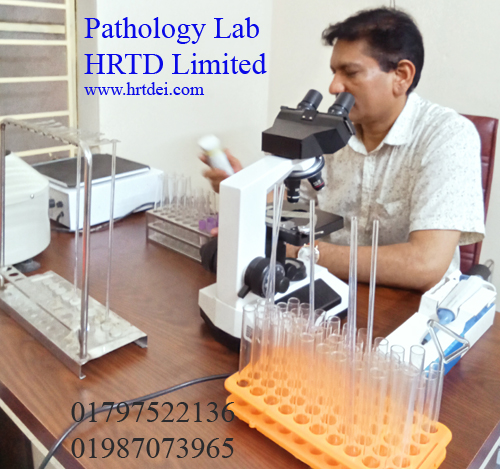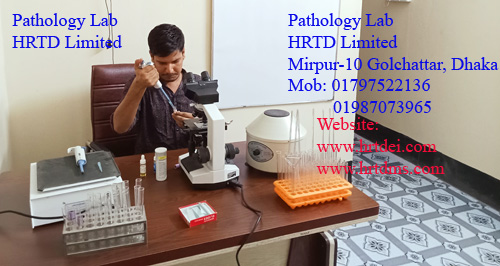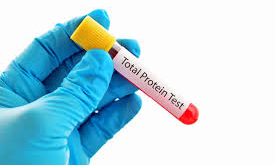Troponin Test

Introduction
The advancement of modern medicine has greatly enhanced our ability to detect, diagnose, and manage life-threatening diseases with speed and accuracy. Among the most significant breakthroughs in cardiology is the Troponin test, a biomarker-based diagnostic tool that has revolutionized the way healthcare professionals identify heart damage, particularly in cases of suspected myocardial infarction (heart attack).
Troponin testing has become a global gold standard for diagnosing heart-related complications. Its ability to detect even small levels of cardiac muscle injury has saved countless lives by enabling early intervention.
In Bangladesh, where the prevalence of cardiovascular diseases is increasing due to lifestyle changes, stress, and dietary habits, the need for skilled laboratory technicians, diagnostic professionals, and clinicians trained in performing and interpreting Troponin tests has never been greater. Recognizing this demand, HRTD Medical Institute, located in Mirpur, Dhaka, has established itself as a premier training hub for Troponin testing and other essential pathological diagnostics.
This article will provide a comprehensive 4000-word overview of the Troponin test, covering its scientific background, medical applications, testing procedures, interpretation of results, limitations, and training opportunities at HRTD Medical Institute.

What is Troponin?
Troponin is a protein complex found in skeletal and cardiac muscles. It plays a vital role in muscle contraction by regulating the interaction between actin and myosin, two proteins essential for muscle movement.
Troponin has three main subunits:
- Troponin C (TnC): Binds calcium ions during muscle contraction.
- Troponin I (TnI): Inhibits actin-myosin binding in the absence of calcium.
- Troponin T (TnT): Binds to tropomyosin, anchoring the troponin complex.
When cardiac muscle cells are damaged, as in the case of a heart attack, troponin proteins are released into the bloodstream. Elevated levels of cardiac-specific troponins (particularly Troponin I and Troponin T) are a strong indicator of myocardial injury.
This is why the Troponin test has become the most reliable blood test for diagnosing heart damage.
The Troponin Test: Definition and Purpose
The Troponin test is a blood test that measures the concentration of cardiac troponin proteins in the blood. It is mainly used to:
- Diagnose acute myocardial infarction (heart attack).
- Assess the severity of heart damage.
- Monitor patients with chest pain or other cardiac symptoms.
- Guide treatment decisions in emergency and hospital settings.
Unlike older cardiac markers such as CK-MB (Creatine Kinase-MB) or Myoglobin, troponin is more sensitive and specific to cardiac injury. Elevated troponin levels indicate even small amounts of heart damage that other tests might miss.
Medical Importance of Troponin
Troponin testing has become a life-saving diagnostic tool for emergency medicine, cardiology, and internal medicine. Its importance lies in the following aspects:
- Early Diagnosis of Heart Attack: A patient with chest pain can be quickly evaluated for cardiac injury, ensuring timely treatment.
- Risk Stratification: Helps in categorizing patients into high, medium, or low risk of complications.
- Monitoring Therapy: Used to check the effectiveness of treatment for conditions like myocardial infarction or myocarditis.
- Differentiating Cardiac vs. Non-Cardiac Chest Pain: Guides physicians in deciding whether the cause of chest pain is truly heart-related.
- Public Health Importance: With cardiovascular diseases being a leading cause of death worldwide, Troponin testing provides an essential screening and diagnostic tool.

Types of Troponin Tests
There are different types of troponin assays available in laboratories:
- Troponin I (cTnI):
- Highly specific for cardiac muscle injury.
- Different assays may have different reference ranges.
- Troponin T (cTnT):
- Another cardiac-specific troponin used widely in diagnostic labs.
- More standardized than cTnI assays.
- High-Sensitivity Troponin (hs-cTn):
- Newer, more advanced version of the test.
- Can detect much lower levels of troponin.
- Allows diagnosis of heart attack within 1–3 hours of onset (earlier than traditional tests).
Indications for the Troponin Test
Doctors recommend troponin testing when patients present with symptoms suggestive of cardiac issues, such as:
- Severe or prolonged chest pain.
- Shortness of breath.
- Pain radiating to the arm, jaw, or back.
- Nausea, sweating, or fainting associated with suspected cardiac events.
- History of heart disease or risk factors (diabetes, high cholesterol, hypertension, smoking).
- Monitoring patients after cardiac surgery or angioplasty.
Sample Collection and Laboratory Procedure
At HRTD Medical Institute, students are trained step by step on how to perform a Troponin test. The general procedure is as follows:
- Patient Preparation: No special preparation is needed. The test can be done anytime, especially in emergency cases.
- Sample Collection:
- Blood is drawn from a vein in the arm.
- Collected in a serum separator or plasma tube.
- Laboratory Analysis:
- Automated immunoassay analyzers are commonly used.
- Some rapid point-of-care troponin test kits are available for emergency use.
- Turnaround Time:
- Rapid kits: Results in 15–20 minutes.
- Laboratory analyzers: Results in 1–2 hours.
Interpretation of Results
The interpretation depends on the reference values of the testing method:
- Normal Range: Very low or undetectable troponin levels (usually < 0.01 ng/mL, varies by assay).
- Elevated Troponin: Suggests heart muscle injury.
- Serial Measurements: Troponin is usually tested multiple times (at 0, 3, and 6 hours) to confirm rising or falling trends.
Conditions Causing Elevated Troponin
- Myocardial Infarction (Heart Attack)
- Myocarditis (inflammation of the heart muscle)
- Heart Failure
- Pulmonary Embolism
- Sepsis
- Renal Failure
Thus, while high troponin levels strongly suggest cardiac damage, they should always be interpreted in combination with clinical history, ECG, and other diagnostic tests.
Troponin in Different Diseases
Troponin testing plays a role in diagnosing not only heart attack but also other medical conditions:
- Acute Coronary Syndrome (ACS): Troponin is the key diagnostic biomarker.
- Chronic Kidney Disease: Troponin may be elevated due to reduced clearance.
- Critical Illness: Patients with sepsis or severe infections may have raised troponin.
- Cardiac Procedures: Troponin monitoring after angioplasty, bypass surgery, or pacemaker insertion helps evaluate cardiac injury.
Advantages and Limitations of Troponin Test
Advantages:
- High sensitivity and specificity.
- Early detection of heart damage.
- Widely available in hospitals and diagnostic centers.
- Essential tool in emergency medicine.
Limitations:
- Cannot differentiate between causes of elevated troponin (cardiac vs. non-cardiac).
- Requires multiple measurements for confirmation.
- Expensive compared to older tests.
- May remain elevated for 7–14 days after injury, limiting use for detecting reinfarction.
Training on Troponin Test at HRTD Medical Institute
At HRTD Medical Institute, specialized training programs have been developed to equip students, laboratory technicians, and healthcare professionals with practical and theoretical knowledge about the Troponin test.
Training Modules Include:
- Basic Cardiac Physiology & Biochemistry of Troponin
- Principles of Troponin Testing
- Sample Collection and Processing
- Use of Rapid Kits vs. Automated Analyzers
- Interpretation of Results with Case Studies
- Hands-on Laboratory Sessions
- Quality Control & Error Prevention
- Ethical and Professional Practices in Patient Care
By the end of the training, students are prepared to work confidently in hospitals, diagnostic centers, and emergency care units.
Why Choose HRTD Medical Institute?
- Experienced Faculty: Trainers with years of experience in pathology and diagnostics.
- Modern Laboratory Facilities: Equipped with automated analyzers and rapid testing kits.
- Practical Training Approach: Emphasis on hands-on sessions rather than only theory.
- Affordable Training Programs: Accessible to students and healthcare workers across Bangladesh.
- Location Advantage: Situated in Mirpur, Dhaka, making it convenient for students from different parts of the city.
- Career Support: Guidance for placements in hospitals, diagnostic labs, and research centers.
By enrolling at HRTD Medical Institute, students gain not only technical knowledge but also the confidence to save lives through accurate diagnosis.
Future Scope of Troponin Testing
The field of cardiac diagnostics is rapidly evolving. Some future directions for Troponin testing include:
- High-Sensitivity Troponin as a Routine Screening Test for high-risk populations.
- Point-of-Care Devices for immediate bedside results.
- Artificial Intelligence Integration for automated interpretation of troponin values with ECG data.
- Research Opportunities in novel cardiac biomarkers alongside troponin.
Students trained at HRTD Medical Institute will be well-prepared to adapt to these upcoming advancements.
Frequently Asked Questions (FAQ)
Q1. What is the primary purpose of the Troponin test?
The Troponin test helps diagnose heart damage, especially in cases of suspected heart attack.
Q2. How long do Troponin levels stay elevated after a heart attack?
Troponin can remain elevated for 7–14 days, depending on the extent of damage.
Q3. Can high troponin always mean a heart attack?
Not always. Conditions like kidney failure, sepsis, or myocarditis can also raise troponin levels.
Q4. Is fasting required for the Troponin test?
No. The test can be performed anytime, especially in emergencies.
Q5. Where can I receive training for Troponin testing in Bangladesh?
At HRTD Medical Institute, Mirpur, Dhaka, where comprehensive training is provided.
Conclusion
The Troponin test has transformed the diagnosis and management of heart-related diseases, particularly myocardial infarction. Its sensitivity and specificity make it a cornerstone of modern cardiology and emergency medicine.
However, the true effectiveness of Troponin testing lies not only in advanced technology but also in the competence of skilled healthcare professionals who perform and interpret the test.
That is why institutions like HRTD Medical Institute play a vital role in educating and training the next generation of laboratory technicians and healthcare workers in Bangladesh. By combining modern laboratory facilities, expert faculty, and hands-on training, HRTD Medical Institute ensures that its graduates are fully prepared to contribute to saving lives through accurate diagnostic practices.
As cardiovascular diseases continue to pose a significant health challenge, the demand for Troponin testing will only increase. By choosing to train at HRTD Medical Institute, students are not only investing in their careers but also in the future of healthcare in Bangladesh.
 Pathology Training Institute in Bangladesh Best Pathology Training Institute in Bangladesh
Pathology Training Institute in Bangladesh Best Pathology Training Institute in Bangladesh

